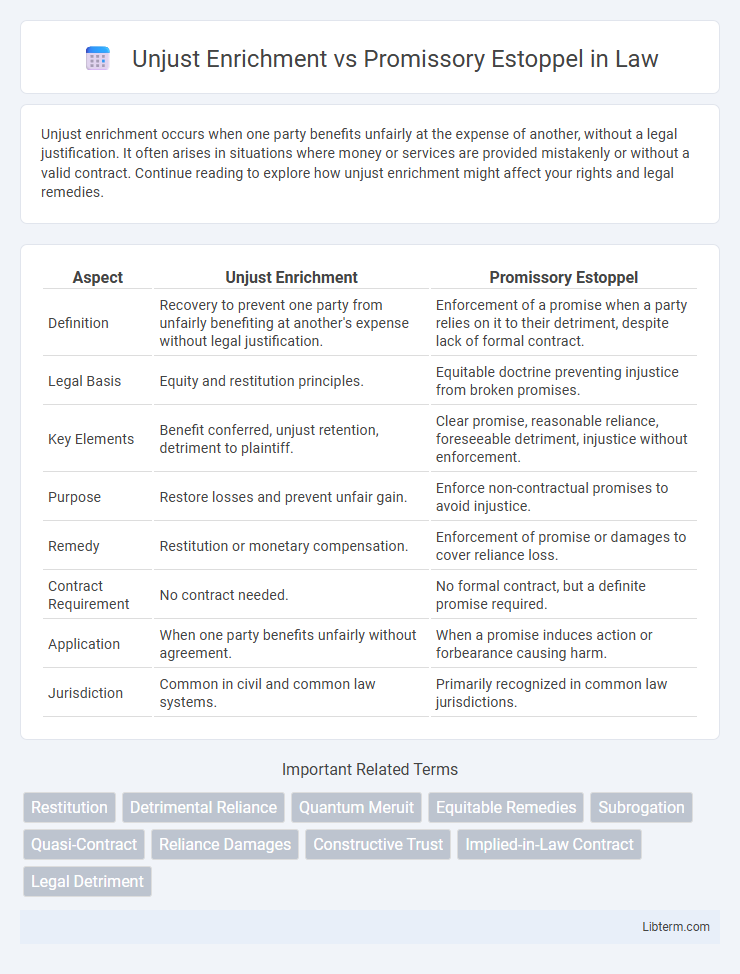Unjust enrichment occurs when one party benefits unfairly at the expense of another, without a legal justification. It often arises in situations where money or services are provided mistakenly or without a valid contract. Continue reading to explore how unjust enrichment might affect your rights and legal remedies.
Table of Comparison
| Aspect | Unjust Enrichment | Promissory Estoppel |
|---|---|---|
| Definition | Recovery to prevent one party from unfairly benefiting at another's expense without legal justification. | Enforcement of a promise when a party relies on it to their detriment, despite lack of formal contract. |
| Legal Basis | Equity and restitution principles. | Equitable doctrine preventing injustice from broken promises. |
| Key Elements | Benefit conferred, unjust retention, detriment to plaintiff. | Clear promise, reasonable reliance, foreseeable detriment, injustice without enforcement. |
| Purpose | Restore losses and prevent unfair gain. | Enforce non-contractual promises to avoid injustice. |
| Remedy | Restitution or monetary compensation. | Enforcement of promise or damages to cover reliance loss. |
| Contract Requirement | No contract needed. | No formal contract, but a definite promise required. |
| Application | When one party benefits unfairly without agreement. | When a promise induces action or forbearance causing harm. |
| Jurisdiction | Common in civil and common law systems. | Primarily recognized in common law jurisdictions. |
Introduction to Unjust Enrichment and Promissory Estoppel
Unjust enrichment occurs when one party unfairly benefits at another's expense without a legal justification, requiring restitution to prevent inequity. Promissory estoppel enforces a promise made without formal consideration if the promisee reasonably relies on it to their detriment. Both doctrines aim to uphold fairness in contractual and quasi-contractual relationships by addressing unjust outcomes arising from reliance or enrichment.
Defining Unjust Enrichment
Unjust enrichment occurs when one party unfairly benefits at the expense of another without legal justification, requiring restitution to prevent inequity. This principle mandates the return of gains obtained through mistakes, fraud, or coercion, ensuring no party retains an undeserved advantage. Unlike promissory estoppel, which relies on a promise and reliance, unjust enrichment centers on the absence of a valid contract and the necessity of rectifying benefit retention.
Core Principles of Promissory Estoppel
Promissory estoppel is rooted in the principle that a promise, which the promisor should reasonably expect to induce action or forbearance by the promisee, becomes enforceable to prevent injustice. It requires a clear and definite promise, reasonable reliance by the promisee, and resulting detriment if the promise is not enforced. Unlike unjust enrichment, which addresses the unfair benefit obtained at another's expense, promissory estoppel focuses on enforcing non-contractual promises to avoid harm from reliance.
Legal Elements of Unjust Enrichment Claims
Unjust enrichment claims require proof of three key legal elements: enrichment of the defendant, at the expense of the plaintiff, and that it would be unjust for the defendant to retain the benefit without compensating the plaintiff. The enrichment can take the form of money, property, or services received without a valid legal basis or contract. Courts typically assess whether the plaintiff conferred a benefit, the defendant's appreciation or knowledge of the benefit, and the absence of a legitimate justification for the enrichment.
Key Requirements for Promissory Estoppel
Promissory estoppel requires a clear and definite promise, reasonable and foreseeable reliance by the promisee, and a resulting detriment if the promise is not enforced. The promisee must demonstrate that their reliance on the promise was substantial and that injustice can only be avoided by enforcing the promise. Unlike unjust enrichment, promissory estoppel does not require a benefit conferred but focuses on preventing harm due to reliance on a promise.
Differences Between Unjust Enrichment and Promissory Estoppel
Unjust enrichment requires that one party benefits at the expense of another without a legal justification, emphasizing the restitution of value to prevent unfair gain. Promissory estoppel centers on enforcing a promise when one party relies on that promise to their detriment, even in the absence of a formal contract. The main difference lies in unjust enrichment focusing on the absence of consent and benefit retention, while promissory estoppel is based on reliance and preventing injustice from broken promises.
Common Legal Scenarios and Applications
Unjust enrichment commonly arises in scenarios where one party benefits at another's expense without a valid contract, such as mistaken payments or services rendered without agreement. Promissory estoppel is typically applied in situations where a party relies on a promise to their detriment, like job offers or contract negotiations lacking formal acceptance. Both doctrines prevent unfair outcomes, but unjust enrichment addresses restitution in the absence of a contract, whereas promissory estoppel enforces reliance-based promises to avoid injustice.
Landmark Cases Illustrating Each Doctrine
The landmark case *Cotnam v. Wisdom* (1907) illustrates unjust enrichment by establishing that a party receiving a benefit without compensation must provide restitution. In contrast, *Ricketts v. Scothorn* (1898) exemplifies promissory estoppel, where a promise enforced without formal consideration prevented injustice due to reliance. These cases provide foundational principles distinguishing unjust enrichment's focus on restitution from promissory estoppel's emphasis on reliance-based enforcement.
Remedies: Restitution vs. Reliance Damages
Remedies for unjust enrichment primarily involve restitution, requiring the defendant to return benefits unjustly obtained to restore the plaintiff's financial position. Promissory estoppel remedies focus on reliance damages, compensating the plaintiff for losses incurred due to reasonable reliance on the defendant's promise. Restitution addresses the defendant's gain, while reliance damages address the plaintiff's detriment.
Conclusion: Practical Implications and Strategic Considerations
Unjust enrichment and promissory estoppel serve distinct yet complementary roles in contract dispute resolution, with unjust enrichment addressing the prevention of unfair benefits without a formal agreement, while promissory estoppel enforces promises lacking traditional consideration. Legal practitioners should assess the availability of concrete promises and the presence of enrichment to strategically determine the most effective claim, optimizing outcomes based on jurisdictional precedents and evidentiary requirements. Understanding these doctrines enhances dispute resolution strategies by balancing equitable relief and contractual enforcement in complex transactional contexts.
Unjust Enrichment Infographic

 libterm.com
libterm.com